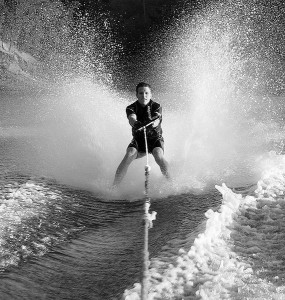By Oliver DeMille
 Summer is the hottest season of the year.
Summer is the hottest season of the year.
This may seem obvious, but sometimes the most obvious things go ignored.
Where we live, we’ve been experiencing record-breaking high temperatures.
The lawns and the swamp coolers in our region have been struggling to cope.
A report on the local news reminded us that it is very important to drink enough water.
After hearing this ridiculously obvious point, I shook my head and laughed.
“It’s amazing how the small things make all the difference,” I told my daughter Sara.
I tried to think of how much water I’d had today, but I couldn’t remember drinking any.
I quickly went to the kitchen and drank a big glass of water.
The Parenting Conveyor Belt
I was reading the latest issue of Psychology Today when this recommendation to drink lots of water caught my attention, and I had just finished an interesting article on parenting.
One phrase really stuck with me.
The article mentioned that too often parenting literature “puts parents on a treadmill…”
That sounds a lot like the conveyor belt.
But a treadmill (as described in Kiyosaki’s book Rich Dad, Poor Dad) keeps people busy, busy, busy without getting anywhere.
Sound familiar?
Too many parents fall into this trap.
It’s a rat race, as Kiyosaki called it.
Simple, not Complex
If we read classics every day, even a little, it’s amazing how manageable it is to get off this treadmill and educate nearly all kids—just like drinking enough water makes a huge difference in how people deal with the heat.
If we forget to drink enough—for whatever reason—the heat can really become a problem.
Likewise, if we stop reading from the classics every single day—for any reason—it’s remarkable how quickly parenting, family issues, and educating the kids can start to feel overwhelming, beyond us, just too hard.
But with enough water and classics, the symptoms of being overheated or overwhelmed as parents can rapidly go away.
Great education really is “Simple, not Complex.”
It takes consistency, but those who read the classics daily are nearly always positive, enthusiastic, and up to the task.
In fact, this is so prevalent that I learned many years ago that anyone who feels like providing a truly quality education for their kids is really difficult is probably not reading the classics every day.
Period.
Are You Reading Enough?
Numerous times I’ve been asked something along the lines of, “Okay, I understand how TJEd and Leadership Education are supposed to work, but what do you do when (some really difficult family or education situation)?”
I learned to respond immediately, “What are the last four classics you’ve read in the past few months?”
I found that well over 9 out of 10 respondents weren’t really reading the classics.
And of the few who were, almost none of them were also reading classics aloud with the kids they had concerns about.
They wanted to provide great education, but they forgot to do the most basic thing.
In short, if we don’t read classics, it’s pretty hard to be an excellent educator-parent—just like it’s tough to deal with the heat if we don’t drink much, or any, water.
If this seems too simple, don’t bash it until you give it a try.
Reading classics has an incredible power to boost our enthusiasm and parenting skills.
I don’t know exactly why this happens, but it does.
It works.
Those who don’t do it are frequently concerned about how to really do leadership education, and often insecure about many of their parenting choices.
Those who read the classics daily have fewer struggles.
They nearly always feel more secure, less overwhelmed, and more enthusiastic.
This is real.
So Pull Out Your Next Top Five!
This one choice (to read from the classics every day) gets parents off the treadmill and out of the parenting rat race.
So get out those three or five top books you’ve been meaning to read, and get to work.
Don’t read them one at a time—just structure a time to read and then read whatever is interesting to you each day.
The impact on your parenting and family will be noticeable, immediate, and lasting.
And it might help to drink lots of water while you’re at it.
****************
 Oliver DeMille is the co-founder of the Center for Social Leadership, and a co-creator of TJEd. He is the NY Times Bestselling co-author of LeaderShift, and author of A Thomas Jefferson Education: Teaching a Generation of Leaders for the 21st Century, The Coming Aristocracy: Education & the Future of Freedom, and FreedomShift: 3 Choices to Reclaim America’s Destiny.
Oliver DeMille is the co-founder of the Center for Social Leadership, and a co-creator of TJEd. He is the NY Times Bestselling co-author of LeaderShift, and author of A Thomas Jefferson Education: Teaching a Generation of Leaders for the 21st Century, The Coming Aristocracy: Education & the Future of Freedom, and FreedomShift: 3 Choices to Reclaim America’s Destiny.
Oliver is dedicated to promoting freedom through Leadership Education. He and his wife Rachel are raising their eight children in Cedar City, Utah.



























I’d suggest that the treadmill reflects a behaviorist mindset–worry that we as the parents are solely responsible for our children’s decisions, believing that if we aren’t constantly creating the perfect environment for them that they won’t make good choices. The classics depict lives of agency, where sometimes bad things happen to good people, and our worth and value can and should be independent of external forces. Perhaps the classics are intellectual “pauses that refresh us” and remind us that supporting choice and agency don’t require treadmill behavior, and in fact are usually hurt by it.
Your blog is often a fresh glass of water for me, Oliver!
It is always good to refresh our understanding of basic vital behaviors to be successful in any endeavor. I needed to read this article today and I will be sharing it with family and friends. Thank you for everything that you and your family do to promote freedom and quality leadership education, Oliver.
Oliver, I really enjoyed your article. As newbie to TJED, I wonder what those classics are. If you could please help get me started on a short list, it would be appreciated. Thanks so much!
Sure, Helen! A lot depends on your interests and the ages/needs of your kids, your previous experience with your education, etc. But never fear! We’ve done our best to try to think through the first few steps in a way that make sense for most people. If all you want is a reading list, check this out: https://tjed.org/resources/classics. There’s lots to choose from, and the main page there (before you get into the specific lists) has several great classics that are ideal for families just getting started with TJEd. For more support, coaching and deeper paradigm shifts, you might enjoy the 7 Keys Certification: http://store.tjed.org/product/trainings/7-keys-certification-i/audio-mp3-e-book-pdf. I can’t say enough good about the quality of Oliver’s audio work in this, and the price is insanely cheap for all the content it provides. Plus, I really poured my heart into the study guides that walk you through, chapter-by-chapter, the books on the reading list, with ideas for discussion, questions and prompts to consider, etc., to really help you get the book through you – and not just get you through it. Please also join the FB Discussion group for additional support: http://facebook.com/groups/tjeddiscussion. xoxo rd
We have just moved to Okinawa Japan. We move frequently and I really enjoy reading classics that include the culture, history, or people’s of where I live. What do you suggest for Okinawa or Japan??
Here are a few: “The Tale of Genji”, “The Moon Princess”, etc. Try this: http://tinyurl.com/jwoyut9
I read your book when I first started homeschooling but thought it didn’t have enough “structure” for what my family needed. Four years later I have fully embraced TJED. Thanks for all the work you do! I loved this article. “You, not them” has helped me the most so far in helping me be a good mentor to my children! I just hope they like politics and history as much as I do (and math, and science, and carpentry, and exercise…)
Ahhh yes, the importance of consistent baby steps in any endeavor. It is so easy for parents to forget their own education when they are concerned about their children’s, and a bit counter-intuitive to focus on their own at those time. Thanks for the great reminder.
Your words about the ‘treadmill ‘ keeping people busy busy busy reminded me of the same sentiment that was expressed in this great math classic – Norton Juster’s The Phantom Tollbooth.
Here Milo is talking to a demon in the Mountains of Ignorance-
”
“but why do only unimportant things?” asked Milo, who suddenly remembered how much time he spent each day doing them.
“think of all the trouble it saves,” the man explained, and his face looked as if he’d be grinning an evil grin–if he could grin at all. “if you only do the easy and useless jobs, you’ll never have to worry about the important ones which are so difficult. you just won’t have the time. for there’s always something to do to keep you from what you really should be doing, and if it weren’t for that dreadful magic staff, you’d never know how much time you were wasting.”